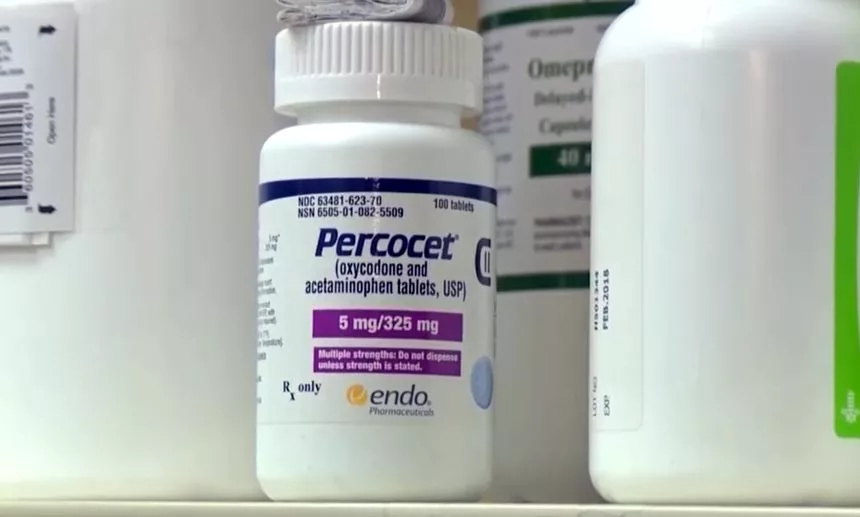Get Answers and More Percocet Facts and Information
Table of Contents
- Get Answers and More Percocet Facts and Information
- How is Percocet Used?
- Understanding Percocet Abuse and Addiction
- How Long Does Percocet Stay in Your System?
- Percocet Drug Testing
- Factors That Affect How Long Percocet Remains In the Body
- Percocet Overdose Symptoms
- Percocet Addiction Treatment Options
- FAQs on How Long Does Percocet Stay in Your System
- Finding Help and Getting Treatment for Painkillers
- Medically Reviewed By
Prescription drug abuse is an increasing issue within the United States. In many cases, some people may believe they are safer to abuse than illicit drugs because they are prescribed by a licensed medical professional. This, however, could not be further from the truth.
Percocet is a prescription medication made up of the opioid oxycodone and acetaminophen which is an analgesic, and the main active ingredient used for Tylenol. While it can be an effective tool for pain relief, as an opioid, it brings with it the risk of abuse and addiction.
With that being said, many people find themselves asking the question of just how long does Percocet stay in your system? Keep reading to find out more about how long it takes for Percocet to leave your body, and how you can get help for substance abuse today!
How is Percocet Used?
Prescription opioids like Percocet are usually prescribed by doctors to patients who are struggling with moderate to severe pain. When prescribed, Percocet is administered in a small tablet form. Percocet can be used to treat chronic pain in the abdomen, and back, as well as the pain that is caused by gallstones and other forms of moderate to severe pain.
When legally acquired, Percocet will usually be prescribed in doses between 2.5 mg and 10 mg. This will vary depending on how severe the patient’s pain is, whether they are using other medications at the same time, and their medical history.
The Drug Enforcement Administration (DEA) currently classifies Percocet as a schedule II controlled substance. This means that, while it has an accepted medical application, it also poses a high risk for abuse.
Over time, this drug abuse can lead to the user forming a psychological or physical dependence on Percocet. As an opioid, a Percocet tolerance can form fairly quickly. This means that, even with a prescription, someone who is regularly taking Percocet will have to use it in larger doses and more frequently over time in order to achieve the same effects.
It is for this reason that understanding how long Percocet remains in the system is important, as this can prevent possible complications from taking too much or experiencing negative interactions with other medicines.
Understanding Percocet Abuse and Addiction
With the increase in prescription drug abuse across the nation, many doctors have begun to restrict prescriptions for medications that may pose a risk for abuse. Taking prescription medications in higher doses, more frequently, or for longer than instructed are all examples of abuse.
Percocet causes dopamine to flood the brain, which can create feelings of extreme euphoria and happiness. This is the same effect produced by other opioid drugs and is what can make Percocet so addictive when not used correctly.
There are many risks that come with abusing Percocet, even outside of forming a dependence on this substance. For starters, combining this substance with other drugs or alcohol can have many dangerous side effects.
Over time, it is possible for this combination to cause the user to develop serious health issues. Someone with a mental health disorder who is taking this drug to help with the painful thoughts and feelings caused by their condition may run the risk of making their disorder worse.
It is for this reason that Percocet will not be prescribed if you are using other opioids or other potentially dangerous medications, or have a history of substance abuse.
How Long Does Percocet Stay in Your System?
In order to understand how long Percocet stays in a person’s system, you must first know how long the Percocet half-life is. This refers to how long it will take half of the drug to be removed from the body. This can also help give you an idea of how long it will take for withdrawal symptoms to kick in.
Oxycodone is an immediate-release drug and short-acting medication, which means its half-life will be equally as short. Generally, it will take about 3-4 hours for Oxycodone to leave a person’s system. Percocet’s other primary ingredient, acetaminophen, has a similar half-life range.
While Percocet’s effects will usually last between four to six hours, it has been found to take about 20 hours for Percocet to completely leave your body. Of course, there are several factors that can affect this relatively short half-life period.
Percocet Drug Testing
If you have an upcoming drug test and have been abusing Percocet, it can help to know how long certain screening methods will be able to detect this form of drug use. Because of how addictive opioids like Percocet can be, many drug tests have been adapted to be able to detect this substance.
With this in mind, it will not be helpful to only take half a dose or temporarily put off your drug use. In order to make sure your test results come back negative, getting professional medical advice and seeking rehab for Percocet abuse is the only way to stop using for good.
Detection Period for Percocet On Urine Tests
One of the least invasive and most common forms of drug testing will be to take a urine test. Their low cost and availability make them a popular candidate for routine employer-ordered testing and medical check-ups.
Furthermore, urine testing can detect multiple different drugs from one urine sample, including opioids and amphetamines. How long a urine test will be able to detect Percocet abuse will depend on several factors. For example, poor kidney and liver function can extend this detection period.
On average, however, Percocet will be detectable on urine tests for up to 48 hours, starting around two hours after you have taken your last dose of this medication.
Detection Period for Percocet On Blood Tests
Blood tests are not commonly used for detecting Percocet, as the drug’s half-life makes this substance only traceable in the blood for around 24 hours. This low detection window, paired with the invasive nature of blood testing makes it a relatively ineffective way of detecting Percocet use.
Detection Period for Percocet On Hair Tests
As a more sophisticated drug testing method, hair testing can detect Percocet use for much longer than other methods. Through using hair follicle samples, hair tests can track Percocet use for as long as 30 days after a person’s last dose.
This method is used as a long-term detection method, and will usually not be used in a clinical or workplace environment. This is because its long detection threshold makes it ineffective for detecting recent or short-term Percocet use.
It is also a more expensive form of testing, and is generally not widely available to the public, making it much more difficult to access when attempting to find out whether someone is having substance abuse problems.
Factors That Affect How Long Percocet Remains In the Body
There are many factors that can affect how long Percocet will remain in your system, including:
- Your Age: While younger individuals usually have faster metabolisms, and therefore remove toxins from their bodies more quickly, those who are over the age of 40 will remove Percocet from their systems much more slowly.
- How Long You Have Been Using: With chronic Percocet use, this drug can slowly build up in your body, meaning it will be detectable for a longer period than someone who has not been using this drug for a while.
- Hepatic and Renal Functions: Your kidneys and liver are the main organs responsible for clearing waste from the body. This means that if you have poor liver or kidney functions, you will metabolize and eliminate Percocet from your body more slowly.
There are a few other factors that may affect how quickly you eliminate Percocet from your system, including your hydration levels, how physically active you are, whether you are taking any other medications, how high a dose, and how frequently you are using the drug.
Percocet Overdose Symptoms
Taking too much Percocet can come with some serious health effects, especially when mixed with other substances or taken without a prescription for it.
In serious cases, this can even lead to an accidental overdose. This can cause severe and often irreparable damage to the liver, complete liver failure, serious breathing problems, respiratory failure, and even death.
If this drug is acquired illegally, there is also the risk that you may be purchasing counterfeit pills, or Percocet that is laced with other dangerous drugs, such as fentanyl. These can be deadly if taken in uncontrolled doses.
As with most other forms of overdose, taking too much Percocet will be considered a medical emergency and will require immediate medical attention in order for its effects to be properly addressed.
Percocet Addiction Treatment Options
There are several treatment programs that can help treat individuals who are struggling with Percocet addiction. Because of the opioid aspect of this medication, it is usually recommended that individuals begin their treatment process with a medical detox program.
While its oxycodone component can help treat moderate to severe pain, it is also what makes the body form a drug dependence so easily. When trying to stop using this medication, it can cause the body to go into withdrawal, which can bring some nasty side effects with it.
Medically-supervised detox can help you safely stop Percocet use while under constant supervision from licensed medical professionals. While at your treatment facility, you will be gradually weaned off of Percocet and likely given other medications to help manage your Percocet withdrawal symptoms and reduce cravings.
Once you have successfully finished the detox process, you will be encouraged to receive further treatment for your substance use disorder through inpatient and outpatient programs. Which of these will be most effective for your recovery will depend on how severe your addiction is.
Speaking with a licensed behavioral health counselor, such as through individual therapy or more intensive behavioral therapies can also help you discover the underlying causes of your drug abuse, and move past these in healthier and substance-free ways.
If you are unsure about what levels of care will be best for your treatment needs, you can speak with a Find Addiction Rehabs representative today to narrow down your options and find recovery services that are best for you!
FAQs on How Long Does Percocet Stay in Your System
When will I begin to feel Percocet withdrawal symptoms?
Because of the relatively short half-life of Percocet, you will begin to feel withdrawal symptoms more quickly in comparison to other drugs that have an extended release formula or longer half-life.
With heavy use or at higher doses, the onset of withdrawal may be quicker, but you can expect to feel symptoms as soon as four hours after the last dose, with eight hours being the typical time. It takes approximately 20 hours for the drug to leave your body completely.
How long does Percocet stay in urine for drug tests?
Typically speaking, the opioid oxycodone, the detectable component of Percocet, takes up to 48 hours to completely leave the body’s fatty tissues and be undetectable in urine drug testings.
Finding Help and Getting Treatment for Painkillers
If you are struggling with addiction and are ready to overcome your drug abuse, know that help is available. The Find Addiction Rehabs hotline is available 24/7 to answer all of your recovery questions and get you started on your treatment journey.
We can help you find addiction treatment centers nationwide that are able to match all of your treatment needs. Your call is private and confidential, so call now, and let us help you take the first step on your recovery journey, today!
Nicole Rogers is an experienced and accomplished writer with special interests in the fields of Anthropology, English, and behavioral health, and has written countless articles for newspaper publications, institutional research journals, and Find Addiction Rehabs.
Her alma mater is Florida Atlantic University in Boca Raton. Nicole hopes to spread awareness of and combat the stigmatization surrounding addiction and substance abuse treatment through her writing and work in the field.





